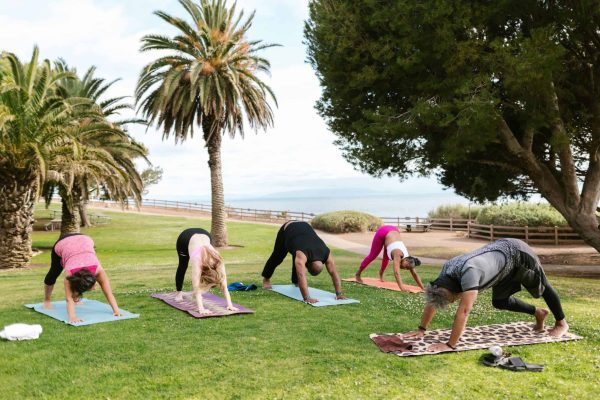
This site is part of an affiliate sales network and receives compensation for sending traffic to partner sites. This compensation may impact how and where links appear on this site. This site does not include all financial companies or all available financial offers. See below for full disclosures.
Traveling opens our minds to new experiences, cultures, and perspectives, but it can also disrupt our health routines. Whether you’re on a business trip or vacation, maintaining your health doesn’t have to take a backseat.
With some planning and simple strategies, you can return from your trips feeling energized rather than depleted (although it still can’t cure the “return from vacation” blues, sorry!). Here are five easy tips to stay healthy while traveling the world.
Want to earn free travel? Learn more about one of my favorite credit cards to get started!
1. Walk Your Way to Fitness and Exploration
Walking is perhaps the most accessible form of exercise and an excellent way to explore new destinations. As a fundamental physical activity, walking requires minimal energy while bringing significant health benefits at any age.
According to research, regular walking can help reduce the risk of cardiovascular disease and type 2 diabetes. It’s also beneficial for mental health, reducing stress and improving mood—particularly valuable during travel when we might face unexpected challenges!
To fit more walking into your travels:
- Choose accommodations in walkable neighborhoods close to attractions
- Opt for walking tours instead of bus tours when possible
- Use public transportation and walk between stops
- Set a daily step goal (10,000 steps is often recommended, but any increase in your normal activity is beneficial)
- Download city walking maps or create your own routes that include major sights
Walking not only improves your health but also offers a unique way to experience your destination. You’ll discover hidden gems, local shops, and authentic experiences that you might miss when traveling by car or tour bus!

2. Stay Well Hydrated
Proper hydration is crucial during travel, especially when crossing time zones, experiencing different climates, or engaging in increased physical activity from your normal routine. Dehydration can lead to fatigue, headaches, and reduced cognitive function—all of which can ruin your travel experience.
Paying attention to your hydration levels is particularly important when traveling by plane, as the low humidity in airplane cabins can accelerate fluid loss. Additionally, visits to hot or high-altitude destinations increase your body’s water needs.
Some easy and practical hydration strategies include:
- Carrying a reusable water bottle and refilling it regularly
- Setting hydration reminders on your phone
- Consuming water-rich foods like fruits and vegetables
- Being cautious with alcohol and caffeine consumption, as these can contribute to dehydration
- In locations where tap water isn’t safe, using bottled water or portable water purification methods
Keep in mind that hydration needs vary based on individual factors, climate, and activity level. The traditional recommendation of eight glasses of water daily may need adjustment based on your specific circumstances while traveling.
3. Pack Smart Snacks for Sustained Energy
Access to nutritious food can be challenging while traveling, especially during long transit periods or when in unfamiliar locations. Strategic snacking can help maintain energy levels, prevent overeating at meals, and ensure you have healthy options available when nutritious choices are limited.
Healthy, portable snack options include:
- Nuts and seeds (almonds, walnuts, pumpkin seeds)
- Dried fruits (apricots, raisins, apple chips)
- Whole-grain (or gluten-free) crackers or rice cakes
- Protein bars (look for options low in added sugars)
- Fresh fruits with durable peels (apples, oranges, bananas)
- Single-serve nut butter packets
- Roasted chickpeas or edamame
When selecting packaged snacks, read nutrition labels carefully. Look for options with minimal added sugars, moderate protein content, and fiber to help maintain energy, nutrition, and satisfaction. Be mindful of food safety regulations when crossing international borders, as many countries restrict the import of fresh produce, meats, and certain other food items.
Local markets at your destination can also be excellent sources of fresh, nutritious snacks, while providing cultural insights and supporting the local economy.

4. Maintain Exercise Routines with Flexible Strategies
Continuing physical activity while traveling helps maintain fitness levels, reduces travel-related stress, and improves sleep quality—particularly valuable when adjusting to new time zones.
Aerobic exercise, which includes activities that increase heart rate and breathing, offers numerous health benefits and can be adapted to various travel situations. Similarly, strength training can be modified using bodyweight exercises when equipment isn’t available.
Flexible fitness strategies for travelers include:
- Researching hotel fitness facilities before booking
- Packing small exercise equipment (resistance bands, jump rope)
- Downloading travel-friendly workout apps with bodyweight routines
- Looking into day passes at local fitness centers
- Exploring active recreation options at your destination (hiking, swimming, kayaking)
- Practicing hotel room exercises (push-ups, squats, lunges, planks)
- Doing activities like yoga that require minimal space and equipment
Even short periods of exercise, as little as 10-15 minutes, can provide health benefits. Try doing these in the morning before you leave for the day. This will also make any physical activity you do that day, like walking up stairs, hiking, or walking all over town, feel less strenuous.
The key is consistency rather than duration, so prioritize regular activity even if your usual workout routine isn’t feasible while traveling.
Use your phone data while you travel without racking up a high phone bill. Click the link to learn more and get a 5% discount on your purchase!
5. Research Local Healthy Food Options
Exploring local cuisine is a highlight of traveling, but balancing culinary adventures with nutritional needs requires some planning. Food safety and regulatory approaches vary significantly between regions.
For example, the European Union and the United States have different approaches to food additives, GMOs, and preservation methods. The EU generally takes a more precautionary approach to food additives and has stricter regulations than the US.
For travelers with food allergies or dietary restrictions, these differences can be particularly significant. In the EU, 14 major allergens must be clearly labeled on packaged foods, whereas US regulations only require labeling of 8 major allergens.
Here are some strategies for mindful and healthy eating while traveling:
- Research typical ingredients in your destination’s cuisine
- Consider accommodations with kitchen access for some meal prep (staying in a VRBO apartment means you can have your own kitchen)
- Balance indulgent, heavy meals with lighter, healthier options
- Explore local markets for fresh produce and authentic ingredients
- For those with severe allergies, consider carrying translation cards explaining your restrictions
For travelers with specific conditions, such as celiac disease, understanding the risks of cross-contamination and ingredient labeling practices in your destination is essential. Resources from international celiac organizations can provide country-specific guidance on gluten-free dining.
And when in doubt, always ask if something contains one of your allergens, even if it typically doesn’t in your home country. It’s better to be safe than sorry!

Final Tip to Stay Healthy While Traveling
My final tip to stay healthy while traveling is: don’t stress about it! If you’re finding it to be too difficult or it’s stressing you out, you won’t be doing yourself any favors. Unless you’re traveling for months at a time, you can course-correct when you get home.
Hopefully, this shows you that you can still stay fit while traveling without sacrificing enjoyment or cultural immersion. These strategies not only support physical well-being but can enhance your travel experience by increasing energy, improving sleep, and allowing fuller participation in activities.
Remember that flexibility is key — adapt these recommendations to your specific destination, travel style, and personal health needs. With thoughtful planning and simple daily habits, you can maintain your health while creating memorable travel experiences that enrich both body and mind!
Have any personal tips to stay healthy while traveling you’d like to share? Put them in the comments below!
Want to read this post later? Save it on Pinterest!
Looking for more travel tips and ideas? Check out my favorite travel products and some of my other posts below!
User-Generated Content (UGC) Disclosure: The responses below are not provided or commissioned by the bank advertiser. Responses have not been reviewed, approved, or otherwise endorsed by the bank advertiser. It is not the bank advertiser’s responsibility to ensure all posts and/or questions are answered.
Disclaimer: Some of the links on this page are affiliate links, which means that, at no extra cost to you, The Abundant Traveler may earn a small commission. Using these links is a huge way to support me, and these will help keep the blog running and free for everyone to enjoy.
All my reviews and opinions are based on my own experience, which may not be the same for everyone. If you choose to use them, then thank you for your support.
Advertiser Disclosure: The Abundant Traveler is part of an affiliate sales network and receives compensation for sending traffic to partner sites, such as MileValue.com. This compensation may impact how and where links appear on this site. This site does not include all financial companies or all available financial offers. Terms apply to American Express benefits and offers. Enrollment may be required for select American Express benefits and offers. Visit americanexpress.com to learn more.
The content on this page is accurate as of the posting date; however, some of the offers mentioned may have expired.
Editorial Disclaimer: Opinions expressed here are author’s alone, not those of any bank, credit card issuer, hotel, airline, or other entity. This content has not been reviewed, approved, or otherwise endorsed by any of the entities included within the post.






